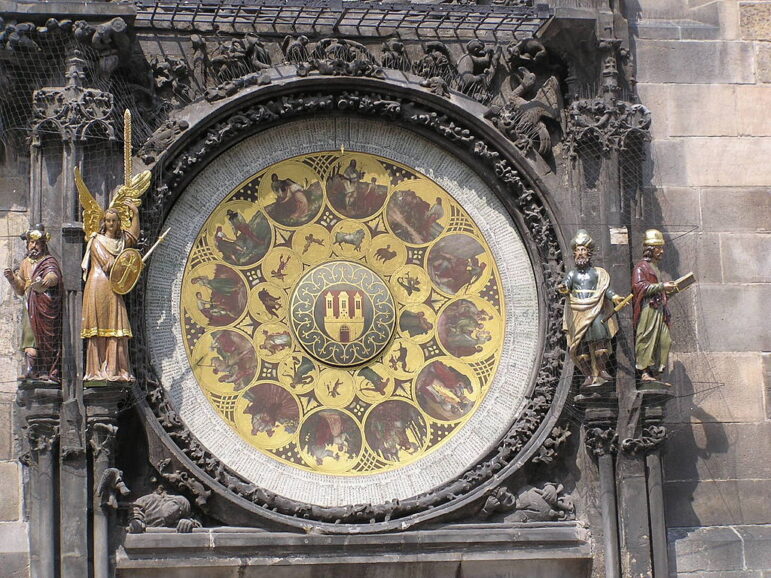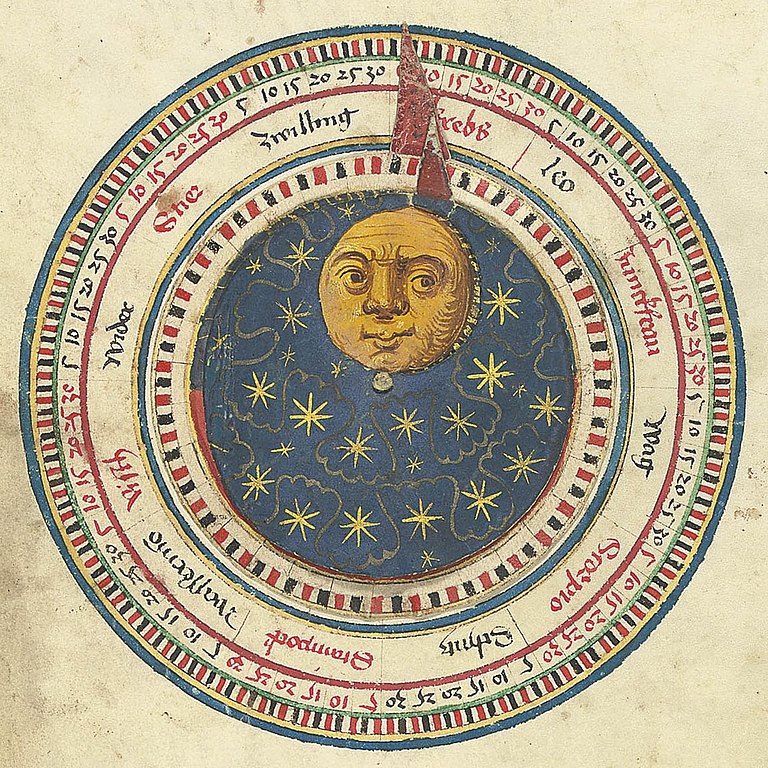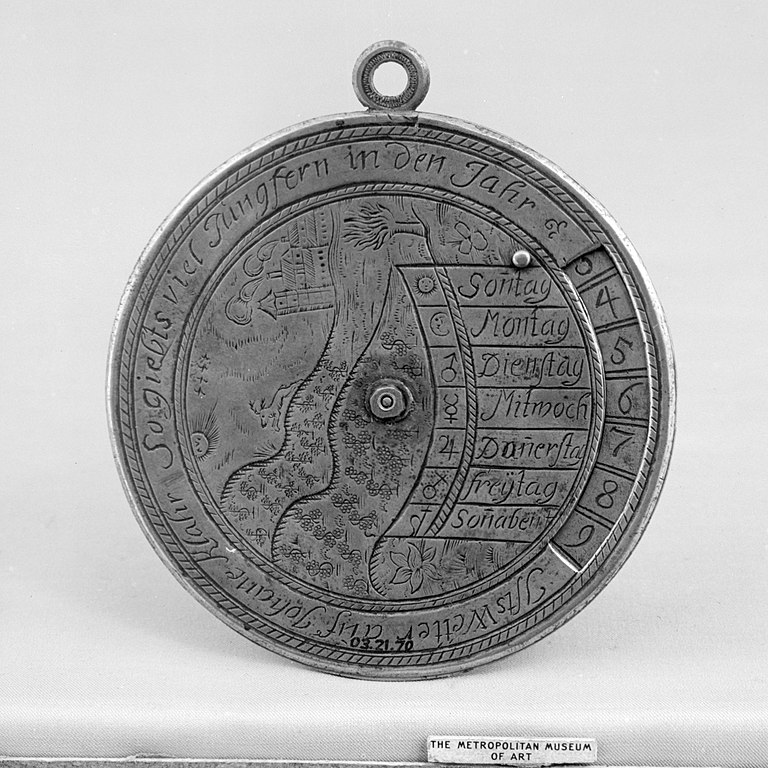
It really doesn’t look like much. The metal seems more likely to be aluminum or tin than silver, with the simple way it is cut and the lack of luster. There are two pieces of it – a strip that is about three inches wide which has been made into a band to circle the head and, affixed to the front, a crescent moon, laying on its side so that the horns will point up.
Part of me thinks that it seems like a craft project, put together by a talented amateur. The rest of me knows that I’m looking at one of the holiest objects of American Paganism. It has pride of place at the Buckland Museum of Witchcraft and Magick, in a display of ritual items that is the first thing that a visitor sees on their tour as the guide explains how Raymond Buckland brought Wicca to America. This, the guide explains, is the headdress Rosemary Buckland wore. Above it, there’s a newspaper clipping of Rosemary in ritual garb with a sensational headline about how a perfectly normal woman might be a Witch.
It’s an old symbol. I’ve seen the statues of Artemis, crowned with a horned crescent moon, from thousands of years earlier – it certainly didn’t start here. But for a moment I consider that all of the depictions I’ve seen of the Goddess with this crown in America, every tarot card and painting, owes part of its existence to this simple metal circlet. I am standing in front of history itself – and the label that explains the display tells me it’s from the mid-60s.
I can’t quite accept that. Going on age alone, this is the sort of thing I might expect one of my aunts to give me as a keepsake. I gawk at it, fingers pressed against my mouth, marveling at how young it is, how simple, how much has changed in such a short time.

Calendar below the Prague Astronomical Clock [Filip Maljković, Wikimedia Commons, CC 2.0]
I have been struggling with time, recently. One of my partners has been doing research about a spirit that we both work with and I have dug in as well, dusting off a few skills and, more importantly, contacts from my time in academia. As with many folkloric figures, the scholarship about him is either nonexistant or so old that it’s absurd – even the 2000s would make an academic question their source, and these tend more towards the 1860s. So, instead, we have been digging back further.
“There’s a collection of stories that puts him in Cornwall,” I tell zir, making a note in our shared bibliography. “We don’t have anything in Cornwall yet, do we?”
“We need to actually make that map,” ze says, and consults zir notes. “No – I don’t think so. Cornish stuff would be exciting. When is it?”
“Uh-” I look at my notes again. “1700s, maybe early 1800s?”
Ze grins. “It’s funny – that seems so new.”

Detail from Johannes von Gmunden’s calendar, Nuremburg, 1496 [public domain]
And so it goes.
In Heathenry, where the earliest of our written sources are a few poems from around 800, the age and vastness of information that the Hellenics can draw from boggles the mind. Working with both pantheons, I shift between understandings of time – what counts as old enough to be ‘authentic’ can vary by as much as a thousand years. Both traditions tend to talk about Christianity as new – the “new religion” that pushed them out of favor – enough so that I sometimes forget that the Western world defines the two thousand years of the Common Era around Christianity. I use models for what is “old enough” to consider seriously in my practice based on instinct and a vague understanding of the world “historiography,” picking up and discarding things from 1000, 1300, or 1800 as either “older than anything else I’ve found” or “too new” – all while the modern Witchcraft movement can be meaningfully traced to the 1940s.
I barely remember the 90s, myself.
“How do you even think about history, when it’s so new?” I ask my friend. “Say a bunch of my friends were sitting at dinner and decided to write something important – is that a historical moment? Or is that just dinner?”
“I think it’s both,” they say, amused. “We were talking about this in UU, with the Water Communion. That only goes back to 1980, but everybody does it, now. It’s easy to forget that it’s so new, but we know the people who started it. I could get their contact info, if I wanted to.”
“Water Communion,” I repeat. “Could you describe that?”
“Sure,” they say. “Why?”
“Because,” I explain, “I’m pretty sure I’ve seen it done in a Pagan space, and I don’t know whether we’re borrowing it from you or you’re borrowing it from us. Especially since the person who leads that circle knows a lot of UU folks.”
They burst into laughter. “See?” they say. “History.”

Perpetual calendar, brass, 16th century, German [public domain]
Many of my traditions find something holy in a sense of time dilation. If you lose an hour in circle then that’s a sign it went well, isn’t it? I operate in reference to mythic time, understanding the gods as every version of themselves at once, a recursive timeline that is both delimited by and constantly breaking cycles.
“The world is always ending,” Loki says, scars stretched thin by his smile. “The world is never ending.” I visit him where he is bound in the cave. I visit him at home, with his children on his knees. We talk for hours. When I come back, only 20 minutes have passed. I think about the stories of people who tarried a night or two in another realm and came back to a world that had moved on without them.
There’s potential here, I think. This is where magic lives, in the tension of things that are and are not, in the fictions that define us. I could sink down roots here and pull up something strange – but I have work at eight in the morning, and class after that, and at some point laundry needs to get done. My life is measured out in hours, and I am grounded in the fiction of time that varies from one state to another. At least, I console myself, none of my traditions uses a different calendar, or at least not one that I can make enough sense of to incorporate.
“When is the heliacal rising of Sirius?” I ask the internet. “Hermes’ birthday is the fourth day of the fourth month – what month is that?” I pour over explanations and competing descriptions and then close the computer with a snap. “April 4th,” I tell myself, and that’s what I put in my calendar.
It all makes me feel very old. It all makes me feel young enough that I might be missed if you blink.
The Wild Hunt is not responsible for links to external content.
To join a conversation on this post:
Visit our The Wild Hunt subreddit! Point your favorite browser to https://www.reddit.com/r/The_Wild_Hunt_News/, then click “JOIN”. Make sure to click the bell, too, to be notified of new articles posted to our subreddit.